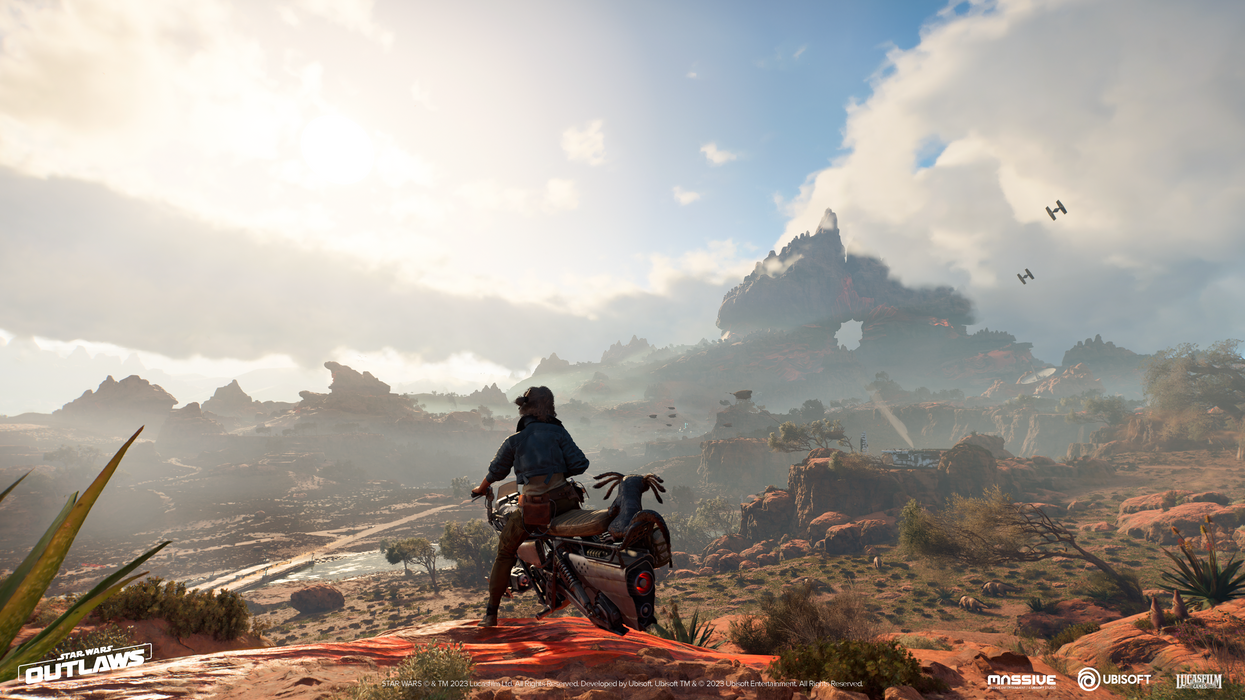
Image courtesy of Ubisoft

Ubisoft is not the most popular video game publisher these days. Popular search results for “Why is Ubisoft —” tend to point you toward “so bad,” “not working,” or “hated.” Regardless, the game maker best known for Assassin’s Creed, Rainbow Six, Far Cry, and Watchdogs notched a huge win by landing itself a Star Wars game: Star Wars Outlaws.
Star Wars is a highly coveted IP, and after being mishandled for a decade by Electronic Arts, the rights to Star Wars were opened back up to studios with winning game ideas for Lucasfilm. Ubisoft’s Star Wars Outlaws drops in August, but already the storm clouds of gamer resentment are gathering for Star Wars’ “first-ever” open-world title. Gamers aren’t happy with the announcement of tiered pricing for Outlaws, ranging from $69.99 to $129.99. In many ways, video game consumers are underserved when it comes to game quality, pricing, and choice, but anger around Star Wars Outlaws is misplaced.
Like with most rage directed at game developers, price is the sticking point for consumers and Star Wars fans waiting to play Outlaws. Ubisoft is offering different editions of the game starting at $69.99 for the base game and a pre-order bonus that includes cosmetic customization for your character’s speeder: $109.99 for that plus three days of early access before launch and a “Season Pass” for upcoming DLC expansions to the game. DLC stands for downloadable content and is usually extra quests, new storylines, and experiences.
For $129.99, consumers can get all of this as well as a digital concept art book for the game and more cosmetic “skins” for your player and vehicles. Lastly, Ubisoft offers Outlaws at $17.99 per month with its Ubisoft+ subscription, which gives subscribers access to all the perks plus 100+ other games from the company's library.
FandomWire called Outlaws tiers an “atrocious pricing strategy,” and the Gamer ran an article saying it was “slimy” and “Star Wars Outlaws has no business charging over a hundred dollars for Ultimate and Gold editions.”
What all of this really means is that the game itself costs $70, and if a gamer deeply desires a pink gun mod, a Han Solo costume for the player's character, a concept art PDF, and 72 hours of early access to the game, then gamers can purchase those things. This complaint encapsulates the long-running debate concerning pay-to-win tactics over rewards tied to merit.

DLCs are different. Game expansions used to be a la carte by design. A game would launch, it would hopefully be successful, and there would be a clear market demand for more content to be added to the game to keep players engaged. Star Wars Galaxies was an early Star Wars massive multiplayer online game with a remarkable base game, then a steady stream of DLC expansion packs that opened up new worlds and quests for players. They were usually around $25 apiece, and over the course of Galaxies’ run, you might have bought four of these DLCs before the game’s servers shut down in 2011.
Gamers are tired, and it’s understandable. AAA games from major studios are coming out very slowly, and they are increasingly being released in hasty fashion with work still to be done through digital updates. Ubisoft has slipped into this on a number of occasions. On top of that, you have the trend of in-game transactions and loot crates changing the relationship between gaming and rewards to be tilted in favor of those willing to pay for perks. This is what won Star Wars Battlefront the most downvoted post in Reddit history at the time it was made.
However, it is impossible to ignore that making games is not a cheap business any more. The resources needed to produce these games are only increasing. The demands of online multiplayer gaming with vast expansive worlds have led to games functioning almost like living documents that receive updates and expansions, requiring continuous revenue to fund the servers bearing the weight of the game’s success. The way publishers have kept prices down to date has been through the very models that gamers are frustrated by.
The world of video games has changed. Gone are the simple days of video game cartridges and disc collections. No studio has perfected a business model that’s both profitable and well liked by consumers in the digital age of gaming. However, a world without tiered pricing options would only further exacerbate identified problems, leaving gamers worse off in the process.
Stephen Kent